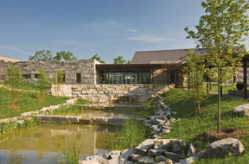Prindle Institue wins LEED award

The Janet Prindle Institute for Ethics recently earned a LEED (Leadership in Energy and Environmental Design) New Construction Gold 2.2 rating by the American Institute for Architects Indiana during the 2008 Design Awards. It is the first new building to achieve gold.
"DePauw wanted to set an example for environmental ethics," said Randy Schumacher of CSO Architects.
The building was designed to minimize impact on the environment. Among its environmental features: ponds were created to clean storm water naturally; native Indiana plants requiring less irrigation; Indiana limestone was utilized; and recycled content -- steel and concrete containing flyash -- was used in the building.
During construction, multiple dumpsters were used to divert landfill waste, earning them two LEED points.
Schumacher, architect for the project, said the building is very "user friendly making the environment comfortable."
The walls have R-value or high insulation value to conserve a great deal of daylight. The windows are designed to let in light for less dependence on artificial lighting.
"The air quality in the building is very good," said Schumacher.
The building was flushed with fresh air for roughly two weeks before it was occupied.
The idea was to purge it of the "new building smell," which is very unhealthy, Schumacher continued.
Cost of constructing a "green" building varies from project to project, said Schumacher, but there is usually a half to three percent difference in price.
"It (building green) is becoming a movement," said Schumacher.
There are numerous architects using green designs out of good practice, he said. Contractors can create green buildings more efficiently.
The built environment has a profound effect on the natural environment, states U.S. Green Building Council.
In the United States, buildings account for 72 percent of electricity consumption; 39 percent of energy use; 38 percent of all carbon dioxide emissions; 40 percent of raw material use; 30 percent of waste output (136 million tons annually); and 14 percent of potable water consumption.
Homeowners can go green on the cheap. Visit www.greenhomeguide.org for a list of several projects that will help save money and the environment.
The Prindle Institute is located in the DePauw Nature Park and was made possible by a gift to DePauw by Janet W. Prindle, a 1958 graduate of the university.
